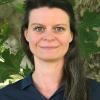
Gerid Hager
Research Scholar
Novel Data Ecosystems for Sustainability Research Group
Advancing Systems Analysis Program
Contact
Biography
Gerid Hager is a research project lead in the Novel Data Ecosystems for Sustainability Research Group of the IIASA Advancing Systems Analysis Program. She develops participatory approaches and tools to science and the understanding of systems, including citizen science, serious games, social simulations, and participatory systems modeling. She is co-principal investigator of Urban ReLeaf (2023-2026), a Horizon Europe project that aims to foster citizen-powered data ecosystems for inclusive and green urban transitions and to facilitate the uptake of citizen science data and practice in authoritative data flows and urban policymaking.Hager first joined IIASA in June 2016 to lead the Systems Thinking for Transformation project (Systrans, 2016-2017). The Systrans project kick-started "The World's Future – A Sustainable Development Goals Game" – a social simulation game about the interconnected nature of the human-earth system, which she has played with policymakers and students across Europe.
She has a successful track-record of managing international research projects and teams. In addition to Urban ReLeaf, she is currently leading the Citizen Observatory work package of the Horizon 2020 (H2020) FRAMEwork project on biodiversity in farmland landscapes (2020-2025) and she is co-chair of the European Citizen Science Association (ECSA) Agri-food working group. She also led the WeObserve project (2017-2021), an H2020 coordination and support action (CSA), delivering the first Europe-wide Citizen Observatory knowledge platform, and worked on the H2020 EU-Citizen Science project (2019-2021). From 2016 to 2019, she led the science work package of the H2020 GROW Observatory project, a Citizen Observatory focused on engaging food growers in soil moisture sensing to underpin technology-enabled custodianship of land and soil, contributing to sustainable food production, and the validation of soil moisture satellite products.
Prior to joining IIASA, Hager was Department Head of Science and Art Education at the Ars Electronica Center in Linz, a public center placed at the interface of art, science, technology, and society. She worked as a lecturer in teacher training at the Art University Linz and as a high-school teacher.
She holds a master's degree in System Dynamics and an MSc in Business Administration from the University of Bergen, Norway, the New University of Lisbon, Portugal, and Radboud University, The Netherlands. In addition, she holds a magister degree (univ.) in Art and Textile Design Education from the Art University in Linz, Austria.
Last update: 02 FEB 2023
Publications
Hager, G. & Moorthy, I. (2022). Urban ReLeaf – Athens Pilot: Citizen-powered data ecosystems for inclusive and green urban transitions. In: EuroGEO workshop, 8 December 2022, Athens, Greece.
Hager, G. & Moorthy, I. (2022). Urban ReLeaf: Citizen-powered data ecosystems for inclusive and green urban transitions. In: EuroGEO workshop, 8 December 2022, Athens, Greece.
Wehn, U., Ajates, R., Fraisl, D. , Gharesifard, M., Gold, M., Hager, G. , Oliver, J.L., See, L. , Shanley, L.A., Ferri, M., Howitt, C., Monego, M., Pfeiffer, E., & Wood, C. (2021). Capturing and communicating impact of citizen science for policy: A storytelling approach. Journal of Environmental Management 295 e113082. 10.1016/j.jenvman.2021.113082.
WeObserve consortium, (2021). WeObserve Cookbook. [Teaching Resource]
Haklay, M., Fraisl, D. , Greshake Tzovaras, B., Hecker, S., Gold, M., Hager, G. , Ceccaroni, L., Kieslinger, B., Wehn, U., Woods, S., Nold, C., Balázs, B., Mazzonetto, M., Ruefenacht, S., Shanley, L.A., Wagenknecht, K., Motion, A., Sforzi, A., Riemenschneider, D., Dorler, D., Heigl, F., Schaefer, T., Lindner, A., Weißpflug, M., Mačiulienė, M., & Vohland, K. (2021). Contours of citizen science: a vignette study. Royal Society Open Science 8 (8) p. 202108. 10.1098/rsos.202108.